The Real History of Koh-I-Noor Diamond: The King of All Diamonds
“Koh-I-Noor” diamond is the world’s largest diamond and in English, the word Koh-i-Noor means “Mountain of Light”. Throughout the history of Koh-i-Noor diamond, it has been the center of debate and controversies and nowadays the sole debate is that it should be returned to India, the birthplace of the diamond. In 2013, U.K Prime Minister David Cameron during his visit to India said that it would be illogical to return the diamond. Now, the question arises why it should not be returned to India? And if not returned to India, is it right for Britain to claim its possession? According to the Gemological Institute of America, until 1896 India was the only source of Diamonds in the world. Some of the biggest, brightest and precious stones in the world were mined from mines situated in India like Koh-I-Noor, Daria-i-Noor, Noor-ul-Ain. To claim the possession of diamond it is necessary for us to know the real history of Koh-i-Noor Diamond and therefore in this article, we would be covering the real history of the Koh-I-Noor diamond, from where the Koh-I-Noor Diamond was mined, how it was passed to successive Muslim rulers of India and finally it was transferred to the British Crown. Through this article, we would try to prove that India’s claim for a diamond is correct and it should be returned back to India.
Qucik Navigate:
Origin of History of Koh-i-Noor Diamond
The exact origin of Koh-I-Noor diamond is not confirmed but there have been many theories proposed for its origin like:
Also Read: Amazing & Interesting facts about Hinduism
1) It is believed that diamond was mined from Kollur mines, in the present-day Guntur district of Andhra Pradesh and during the reign of the Kakatiya Dynasty. Initially, the diamond was installed in a Hindu Temple as an eye of the Hindu Goddess.
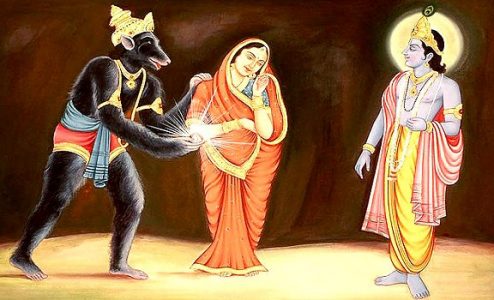
2) The diamond was mined from Kollur mines during 3200 B.C and it was passed to Jambavantha. Lord Krishna fought with Jambavantha for eighteen days and after realizing who Krishna was, Jambavantha submitted. He gave Krishna the diamond and also presented him his daughter Jambavanti. Lord Krishna called the diamond “Samantik Mani” and said:
“He who owns this diamond will own the world, but will also know all its misfortunes. Only God, or a woman, can wear it with impunity.”
Over a period of time the Muslim Slave Dynasty of Delhi got its possession and then it was won by Hindu King of Madhya Pradesh. The Malwa king of Madhya Pradesh was defeated by Kakatiya Empire. They took the possession of the diamond and installed it as one eye of the Hindu Goddess in their temple.
3) The third story states that the Koh-I-Noor was the part of the biggest diamond in the world “Great Moghul” that weighed 793 carats and has mysteriously disappeared in 1665.
History of Koh-i-Noor Diamond and Size at the time of Origin
When it was mined and uncut it was the largest diamond in the world weighing 793 carats. Historian said that at that time it was the size of a hen’s egg and in the form of a rhombic dodecahedron.
Transfer of Koh-i-Noor Diamond to the Muslim Rulers of India
In 1310 the army of the Khilji Dynasty made a successful raid on Warangal and they acquired the diamond. After the Khilji dynasty, it was transferred to the Tughlaq dynasty, the Lodi dynasty and finally came into the hands of Babur. At that time it was referred to as “The Diamond of Babur”. When Babur took possession of diamond, he valued it “at the price of two days food for the whole world”. After the death of Babur his son, Humayun was engaged in wars with Sher Shah Suri and Akbar, Humayan’s son never kept the diamond with him. Later Shah Jahan built the Taj Mahal in Agra and he placed the diamond into his Peacock Throne. Aurangzeb, Shah Jahan’s son not only dethroned him but imprisoned him in the Agra Fort. It is said that Aurangzeb placed the diamond in such a way that Shah Jahan could only see the beautiful Taj Mahal in a reflection from Koh-I-Noor.
First Cutting of Koh-I-Noor Diamond
When the diamond was in possession of Aurangazeb, he asked Hortensio Borgio a Venetian to re-cut the diamond. Hortensio Borgio took three and a half years to cut the diamond and reduced it to 186 carats. According to historians, Aurungzeb saw this and he became so angry that he refused to compensate and ordered to behead him. During the same time Tavernier, a French traveler was the first person to sketch Koh-I-Noor.
Transfer of Koh-I-Noor Diamond to Nadir Shah of Persia
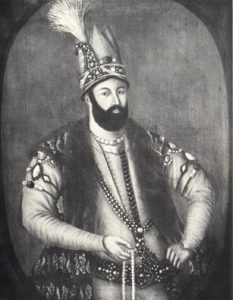
Nadir Shah of Iran made an attack on India in 1739 and the Mughal Army was easily defeated. At the same time, the local population of Delhi killed few soldiers of the Persian army and Nadir Shah ordered the massacre of the local population. 20,000 to as many as 150,000 people lost their lives and the massacre was stopped when Muhammad Shah offered keys of his treasury to Nadir Shah. Shah took control of jewels in the Royal Treasury, that included the famous Peacock Throne and Darya-ye Noor i.e. “Sea of Light”, but Koh-I-Noor was not there.
There is one famous story which states “Muhammad Shah hid the diamond in the folds of his turban and this was known to few including a eunuch. The disloyal eunuch passed the information to shah and Shah planned to take away the diamond from the Mughal emperor. When Nadir Shah was about to return back to Iran, he reminded Muhammad Shah that they should exchange the turbans between kings as a sign of friendship. It was done so quickly that Mughal King was left with no choice but to exchange the turban. After the ceremony was over Nadir Shah ran into his apartments and unfolded the folds of his turban and he found the hidden diamond. Amazed by its size, beauty, and brilliance, he exclaimed: “Koh-i-Noor,” which in Persian means “Mountain of Light.” This is how the diamond got its current name and there is no reference to such name prior to this. The value of Koh-I-Noor calculated by one of Nader Shah’s consorts was:
“If a strong man takes five stones and throw one north, one south, one east, and one west, and the last straight up into the air, and the space between filled with gold and gems, that would equal the value of the Koh-I-Noor.” [wp_ad_camp_4]
Return of Koh-I-Noor Diamond Back to India
In 1747, Nadir Shah was assassinated by his own guards and the diamond came in control of Shujah Shah Durrani but he was defeated and made prisoner by his brother, Mahmud Shah. However, before being captured, he managed to send his family to Punjab to seek refuge with Maharaja Ranjit Singh. Maharaja marched and got Shah Shuja released and took the possession of Koh-I-Noor. Ranjit Singh wore the diamond on all the important occasions. It is said that at the time of the death of Ranjit Singh in 1839, his priests tried to get the diamond to be donated to the Temple of Jagannath. Though he agreed, he was unable to speak and so the royal treasure refused to release the diamond.
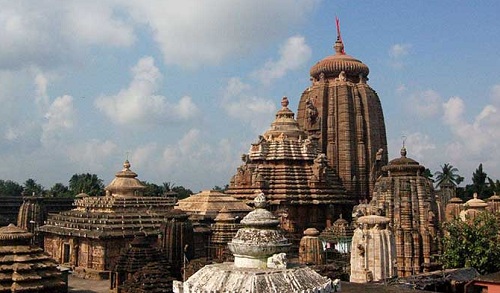
The accusation of Koh-I-Noor Diamond by East India Company
The Sikhs were defeated in the Anglo-Sikh war and Britishers didn’t execute the will of Raja Ranjit Singh. According to the Treaty of Lahore:
”The gem called Koh-i-Noor which was taken from Shah Shuja-ul-Mulk by Maharajah Ranjit Singh shall be surrendered by the Maharajah of Lahore to the Queen of England.”
Lord Dalhousie was the Governor-General of India and he made arrangements to transfer the diamond to Queen Victoria. According to Dalhousie, the stone (Koh-I-Noor) was the spoil of war and it should be surrendered from defeated one into the hands of the conqueror of the diamond, rather than presenting it as a gift to the queen. So Duleep Singh handed over the diamond to the Queen at a ceremony on 3 July 1850, at that time Duleep Singh was only 13 years old.
Center of Attraction at the Great Exhibition of 1851
The diamond brought from India was displayed at The Great Exhibition of 1851. It was one of the most popular attractions of the India exhibit, Daria-i-Noor diamond (cousin of Koh-I-Noor) was also present. For the diamond The Times reported:
“The Koh-i-Noor is at present decidedly the lion of the Exhibition. A mysterious interest appears to be attached to it, and now that so many precautions have been resorted to, and so much difficulty attends its inspection, the crowd is enormously enhanced, and the policemen at either end of the covered entrance have much trouble in restraining the crowd.”
Second Cutting of Koh-I-Noor Diamond
At the time of second cutting the diamond weighed over 186 carats and it was a huge diamond but disappointing in appearance. So the decision was taken to recut it, and Messrs Coster of Amsterdam was given the job. It took 38 days, 12 hours each and £8,000 for overall cutting. The diamond was cut from 186 carats to 105.6 carats which reduced the weight of it by 42% and emerged as an “oval brilliant”. Afterward, the diamond was mounted in a brooch which Victoria often wore. It was given special status and was kept at Windsor Castle rather than with the rest of the crown jewels at the Tower of London.
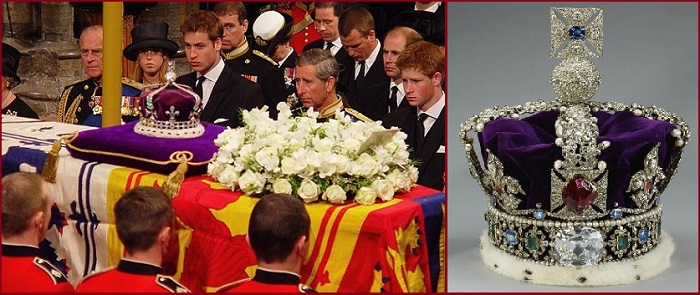
Current state and Location of Diamond
The diamond was mounted in a tiara for the Queen and then incorporated in the coronation crown of Queen. In 1937 the Koh-i-Noor was transferred to a crown made for Queen Elizabeth and there it remains to this day, set into a Maltese cross. When the Queen Mother died in 2002 the crown was placed on her coffin for her lying in state. When Queen Victoria died she left in her will that the Koh-i-Noor should only be worn by a female queen because she was also aware of the fact:
“He who owns this diamond will own the world, but will also know all its misfortunes. Only God, or a woman, can wear it with impunity.”
This is the complete history of Koh-I-Noor Diamond and if we go by the historical accounts the diamond was mined in India and it stayed in India for more than 1000 years. Therefore any claim of Britain on this precious diamond is baseless and they should return it back to India.

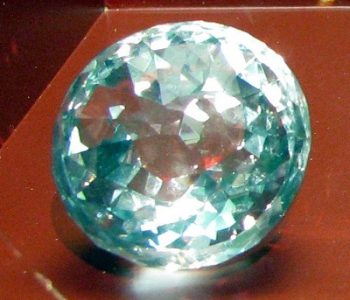


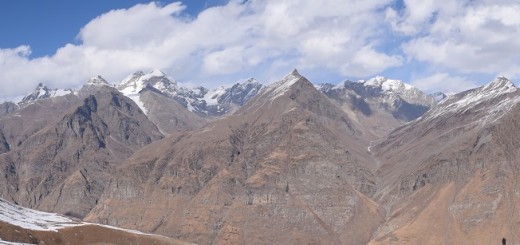

very good info
VERY NICE
ITS AMAZING